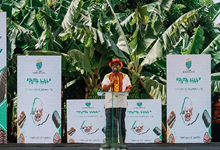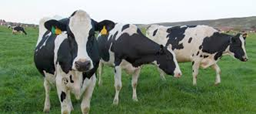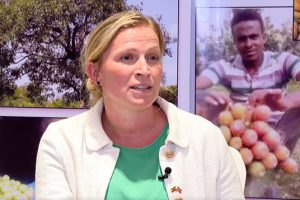
In 2022, Ethiopian Prime Minister Abiy Ahmed (PhD) launched the “Yelemat Tirufat” national nutrition initiative. The initiative is a national program designed to implement a balanced diet at the household level by merging best practices from key national initiatives such as Green Legacy, Wheat, and Avocado Production.
This initiative serves a variety of aims, including promoting family nutrition and dramatically increasing milk, egg, poultry, and honey production across the nation. As a result, this development campaign concentrates on nutritional opulence.
The effort is intended to tie to the country’s traditions. The traditional food container, “Lemat,” serves as a link between farmers, pastoralists, and consumers. It is about getting enough nutritious food. Food self-sufficiency is inextricably tied to national sovereignty and dignity, and the “Yelemat Tirufat” campaign accelerates the country’s efforts to attain food self-sufficiency on both the family and national levels. Furthermore, the initiative aimed to boost animal production and productivity, maintain food security, generate job opportunities, expand exports, and replace imported animal products with domestic ones.
Specifically, the program began with milk, eggs, chicken meat and honey. As a result, the initiative seeks to raise chicken meat production from 90 thousand tons to 296 thousand tons, egg production from 3.2 billion to 9.1 billion, and honey production from 147 thousand tons to 296 thousand tons. More notably, the program intends to double milk production from 6.9 billion to 11.7 billion liters.
The program has been in place for a long period, with a significant and varied range of outcomes. One of the basic questions to ask is what results the program has accomplished in terms of milk production so far. Another critical topic is what steps should be taken to ensure the program’s long-term viability.
According to Ethiopian Ministry of Agriculture State Minister Fikru Regassa, the Yelemat Tirufat initiative’s success demonstrates the country’s continued efforts to improve food security, smallholder farmers’ livelihoods, and agricultural productivity.
Particularly, Ethiopia’s dairy sector has experienced dramatic growth, with milk production tripling to 12 billion liters and crossbred cow numbers increasing eightfold in three years under the “Bounty of the Basket” (Yelemat Tirufat) initiative.
Since its inception, the initiative has resulted in a significant rise in dairy production, owing largely to focus crossbreeding initiatives and improved farming techniques implemented throughout four major agricultural clusters. Most crucially, the “Bounty of the Basket” initiative has boosted the number of high-yield dairy animals as well as overall milk output, he explained.
According to the State Minister, “before the commencement of the initiative, we could simply look at the number of crossbred animals that we produced each year. About 500,000 animals were crossed each year. And in the first year of the “Bounty of the Basket”, it’s 1.2 million animals, which is double. In the second year, we planned 2.4 million, and we succeeded. And this year, the third year of the initiative, we planned 3.8 million animals to be crossbred, and we are now at 2 million.”
As part of the initiative, Ethiopia’s annual milk production has nearly doubled, climbing from 5.8 billion liters to a projected 12 billion liters, demonstrating the impact of improved breeding techniques, better feed availability, and farmer capacity-building efforts, he elaborated.
This surge in production is attributed to better breeding techniques, improved feed availability, and comprehensive capacity-building efforts for farmers.
The State Minister also emphasized that to sustain this rapid expansion, Ethiopia has invested heavily in infrastructure and technological advancements, pointing out that one key development has been the establishment of local liquid nitrogen production facilities, crucial for artificial insemination programs.
Ethiopia has acquired five new processing units, with two already operational and three more in the installation phase, ensuring a reliable supply for nationwide crossbreeding activities, and by the end of this year, the total number of liquid nitrogen plants will reach 10, he stated.
The initiative also aims to strengthen milk processing and distribution. Farmers are being integrated into cooperatives and unions to enhance market participation.
Local processing plants have been established to produce dairy products like yogurt, cheese, and butter, while larger-scale processing facilities in cities such as Addis Ababa, Bahir Dar, and Hawassa support broader distribution networks.
New plants have been set up in strategic locations such as Gondar, Bahir Dar, and Jigjiga, reducing reliance on centralized supply hubs and cutting transportation costs.
The State Minister noted, “We are ensuring that farmers have access to affordable, high-quality animal feed in all regions, which is crucial for sustaining milk production and supporting the growing population of crossbred cattle.”
With increased milk availability, dairy consumption has risen, contributing to the fight against malnutrition and childhood stunting. “Households now have access to nutritious dairy products such as milk and eggs, significantly improving their dietary intake,” he added.

Empowering cooperatives and unions is crucial for local producers to drive industry growth,” stated the State Minister. “We prioritize foreign investment alongside ensuring our farmers have the tools to expand their contributions.”
The success of the “Bounty of the Basket” (Yelemat Tirufat) initiative is revolutionizing Ethiopia’s dairy sector, establishing a robust foundation for sustainable agricultural development. He emphasized that through strategic partnerships, infrastructure enhancements, and innovative policies, Ethiopia is making significant strides towards food security and economic prosperity, serving as a model for agricultural transformation in Africa.
To accelerate dairy sector growth, a high-level workshop convened today at ILRI in Addis Ababa where stakeholders, policymakers, researchers, and private sector leaders collaborated to develop a unified national strategy.
ILRI Senior Scientist Gebregziabher Gebreyohanes highlighted the forum’s goal, which was to foster synergies among sector institutions. According to the scientist, this board would provide crucial oversight and strategic direction, ensuring sector stability and expansion. Gebregziabher also emphasized ILRI’s ongoing partnership with the government to enhance dairy quality across all indicators.
In general, “Yelemat Tirufat” is an effort that seeks to solve a variety of issues in Ethiopia, including food security. Given the country’s diverse agricultural topography and the major impact of climate change, food security remains a critical concern. Hence, “Yelemat Tirufat” and similar projects, by addressing these issues, play an important role in improving food security in Ethiopia, ultimately contributing to the well-being of its people and the viability of its agricultural systems.
Despite its achievements, currently the supply of fodder shortages becomes a major challenge for the initiative. Therefore, partners, donors, and stakeholders should work together to ensure the availability of cost-effective, environmentally friendly, and accessible fodder for individuals partaking in the “Yelemat Tirufat” initiative.
BY EPHREM ANDARGACHEW
THE ETHIOPIAN HERALD SUNDAY EDITION 16 MARCH 2025





